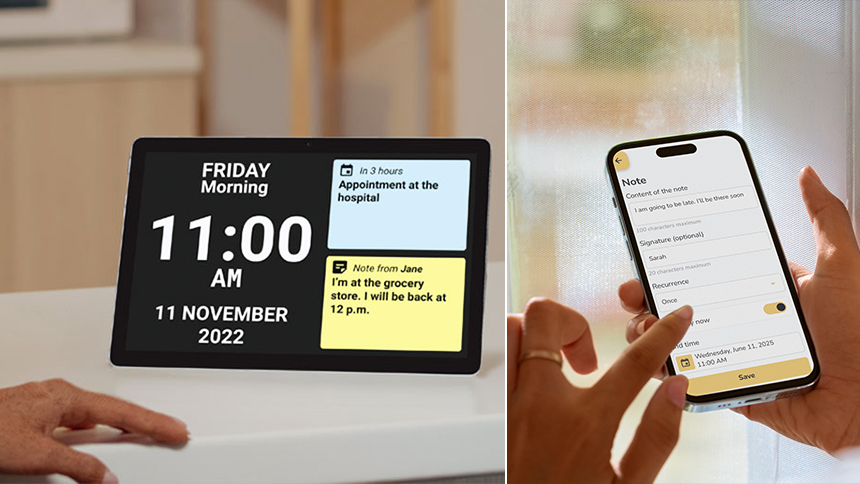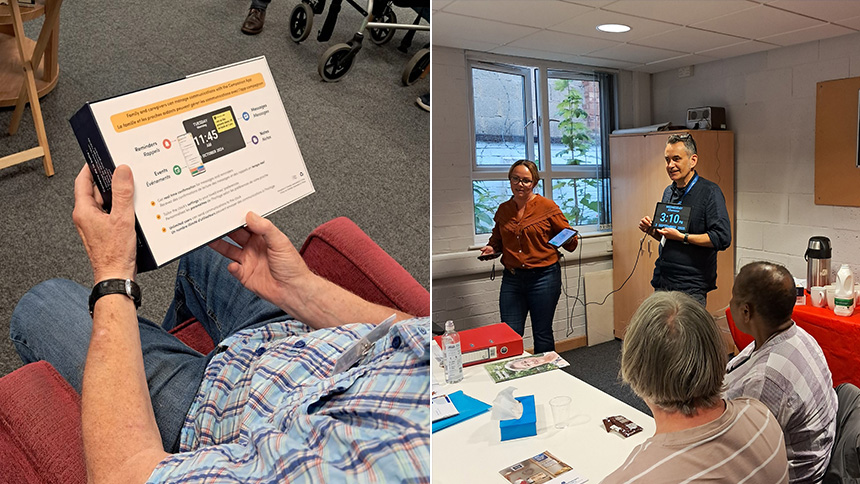Real stories
People affected by dementia try out a smart reminder device
A group of people with dementia and carers try out a new reminder clock that also helps you stay connected with family and friends.
Staying on top of tasks and events, such as taking medication and attending health appointments, is important when you have dementia.
People use many memory aids and tools to make this easier, from wall planners and sticky notes to voice-controlled speakers. It’s all about working out what’s best for you.
Regular reminder clocks, which prompt you to do daily tasks, are a popular option. The new Idem smart clock also helps you stay connected with friends and family.
We visited Peterborough’s Dementia Resource Centre to find out what people affected by dementia thought about it.

Ideas for great memory aids
People with dementia come to the centre in Peterborough for group meet-ups, activities, one-to-one support and its warm, welcoming atmosphere.
We asked them what they currently use to keep track of important tasks.
Many said they use the Rosebud reminder clock. Hilda told us she loves hers and added, ‘My family have helped me set it up and programmed in messages.’
Norma agrees and says she got one because she’s ‘always losing her paper diaries’.
Several people also use voice-controlled technology, including Alexa, which family members helped to install.
‘My daughter’s set up speakers all around the house,’ said Alan.
‘Once the reminders are set up, they’re repeated three times.
This includes every tablet and medicine I have to take, when I have to make a phone call and so on – all the things that will help me lead a normal life.
The group talked about the wider benefits of assistive technology.
They said they’ve learned to embrace it, often with lots of support.
Howard told us about the devices his wife had fitted in their home so she knows if he goes out on his own.
‘We did it after I got lost leaving the house and someone had to bring me home. It gives my wife peace of mind.’
Howard added that these were fitted by the council for free – a great reminder to check what’s available from your local services.
How the Idem smart clock works
The Idem is the size of a tablet device, with a large and easy-to-read screen. This shows the time, date and day of the week.
It can be loaded with reminders and notes, which a friend, family member or carer can control through an app on their mobile. They can also send you photos and greetings.
If you have several people supporting your care, there’s no limit to the number of people you can allow to access the app.
As the person using the clock, you don’t have to worry about doing anything or setting it up.
It simply needs to stay plugged in – you just tap the screen to say you’ve heard or seen each reminder. If you don’t, whoever uses the app to update your clock will be notified.
Easy set up
A few group members were bemused by the product’s name – ‘Why is it called a clock when it does much more?’ said Alan.
But they liked the idea that they wouldn’t need to programme it themselves.
‘I like that, because I can’t work anything digital – that’s why I have a normal watch,’ said Graham.
‘It could help if you’re living on your own, to help you stay independent,’ added Doug.
David would like his daughters to have another way to stay involved with his care because he hardly uses his mobile phone.
‘They could use this to check up on me and remind me of things I need to do.’

Staying connected when you have dementia
The Idem can be connected to wifi for free or you can pay to use a SIM card, like a mobile phone.
You can adjust the brightness according to your preferences and time of day. It talks – you can activate a read-aloud feature for messages and reminders and for the time.
It chimes on the hour, but you can turn these off. It comes with five language options – English, Spanish, Italian, Arabic and French – and more are coming.
But of all the features, group members were most excited about the Idem helping people to stay in touch with others.
They loved the idea of receiving live personal messages and photos, such as birthday greetings.
‘That sounds great. Wouldn’t it be great if all the messages were positive?’ added Hilda.
Because most of our group already had systems that worked for them, they felt the Idem would be best for someone looking for a new device.
Some thought it needs to do more to warrant its price. However, they also recognised that keeping devices simple is also vital. ‘I’d like it more if it talked like an Alexa and allowed you to have video calls,’ said Graham.
Chris underlined the importance of involving people with dementia when developing devices.
‘It’s really important that we are part of the design process.’
What did carers think about the Idem smart clock?
We showed the Idem to carers at the Dementia Resource Centre too.
They liked that you could control the device through a phone app. They also appreciated being able to tell if reminders and messages had been seen or if the clock was disconnected.
‘Is it an easy app to use?’ asked June. ‘I usually get my grandkids and daughters to help with my tech.’
The carers handed round a mobile phone with the app to have a look.
Sarah liked that you could have several people contributing – useful for family members and friends spread out around the country.
She also asked the number of reminders you can upload and how many are displayed at any one time. Jodi confirmed that you can upload unlimited reminders, but only two are visible at any one time to prevent overload.
‘We use a lot of paper reminders at the moment!’ added Sarah.
Unlike the group of people with dementia, the carers thought the price was reasonable for something that would give so much peace of mind.
‘Reassuring’ was the word that kept coming up while the group of carers chatted about the Idem.
Product prices (excluding VAT)
- Idem smart clock – £200
- Rosebud reminder clock – £78.24
You can buy the Idem smart clock and Rosebud reminder clock VAT free if for use by a person with dementia or other conditions.
To save 20% on these and many other specially designed products, tick the box stating you’re eligible for VAT relief at checkout.
Using technology to support daily life with dementia
How tech can help you to maintain your independence, keep safe, and stay active and involved.

